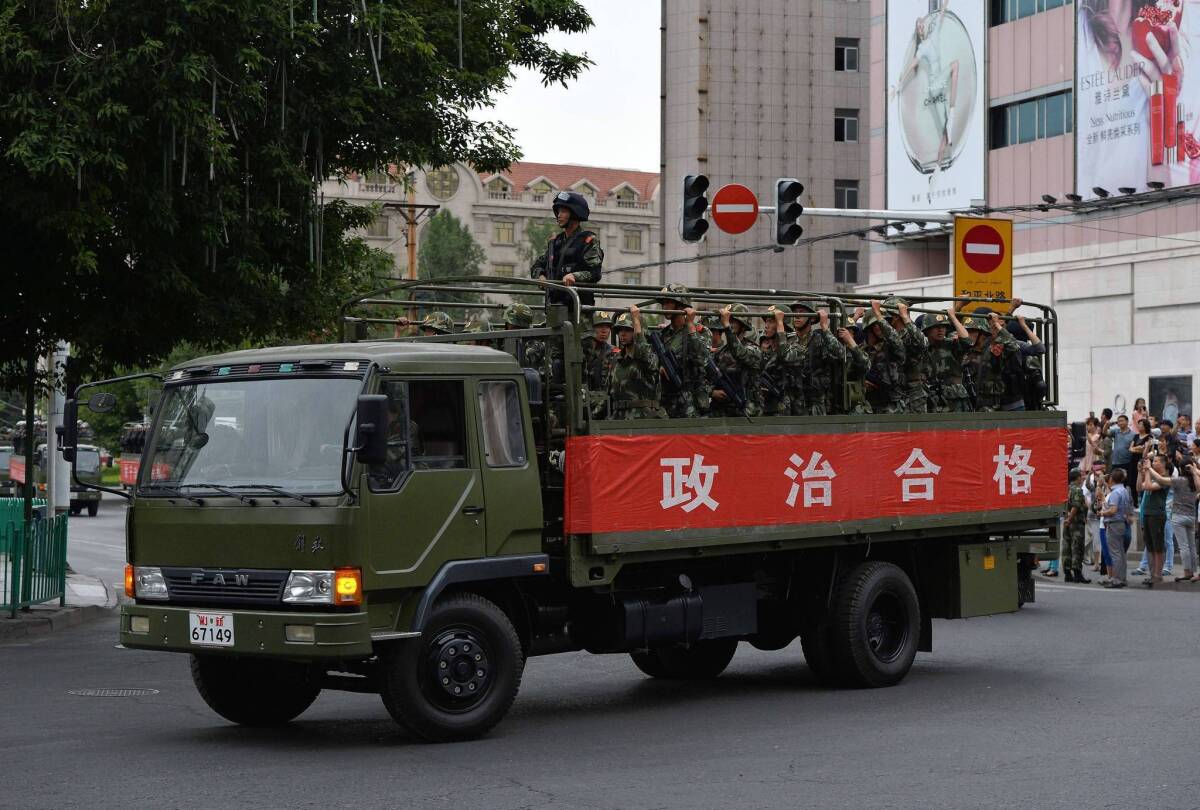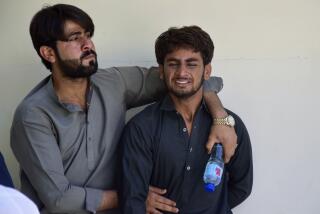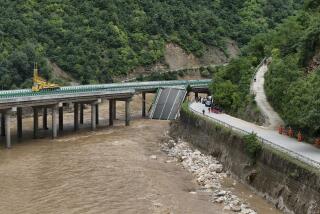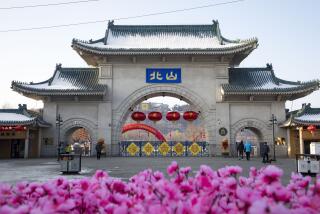China sends armored vehicles to volatile Xinjiang region

BEIJING — Dozens of armored vehicles and military trucks rolled into the capital of the western Chinese region of Xinjiang on Saturday as President Xi Jinping ordered tighter security after at least two outbreaks of violence last week.
Photos from Urumqi showing dozens of white armored vehicles and open-topped trucks filled with troops and police in riot gear circulated on the microblog service Weibo. An Agence France-Presse reporter on the scene said the action shut down large sections of the city’s center, with hundreds of armed troops massing in People’s Square.
The display of might came amid rising tension between minority Muslim Uighurs and Han Chinese authorities as the region prepares to mark the fourth anniversary of ethnic clashes that left nearly 200 people dead in Urumqi in July 2009.
In the latest incident Friday, state-run media said more than 100 knife-wielding people riding motorbikes attacked a police station in the city of Hotan; the number of casualties was unclear Saturday.
Official media reported no injuries or deaths but Radio Free Asia said two people may have been slain by police officers who had become unnerved when Uighurs began shouting religious slogans after leaving a mosque.
The violence Friday followed a bloody clash Wednesday in the town of Lukqun in which at least 35 people died. State-run media said mobs attacked a government office and a migrant worker dormitory and burned a police station. That was the deadliest incident since the riots in 2009.
Xi presided over a meeting Friday on the situation in Xinjiang with members of the Politburo Standing Committee, the country’s seven-man senior leadership team. Committee member Yu Zhengsheng was dispatched to Urumqi on Saturday and led a meeting of senior officials from throughout the region.
“We will step up actions to crack down upon terrorist groups and extremist organizations and track the wanted,” Yu said, calling the attacks “key threats to national unity and social stability in Xinjiang,” the official New China News Agency reported Saturday evening.
Meng Jianzhu, secretary of the Commission for Political and Legal Affairs of the Communist Party, said at the meeting that law enforcement should take precautionary and preemptive measures to guarantee stability in Xinjiang.
State-run media have said the attack in Lukqun was carried out mostly by Uighurs and mainly targeted Uighur police officers, and the Han victims were all migrant workers at a construction site.
The World Uyghur Congress, a Germany-based advocacy group, has expressed skepticism about the official accounts of the Wednesday and Friday incidents but said it’s had difficulty reaching residents because communication links have been shut down.
Uighurs complain that authorities dismiss their concerns over poor job prospects, housing and harsh policing and are too quick to denounce complaints as calls for separatism.
Rohan Gunaratna, head of the International Center for Political Violence and Terrorism Research in Singapore, said in an interview that although China has legitimate concern about the East Turkistan Islamic Movement, considered to be a terrorist group, authorities need to focus on engaging much more deeply with ordinary Uighurs.
“The Chinese government needs to have a more strategic approach” in Xinjiang, he said. “Unless China invests more time building bridges, there’s potential for the situation to deteriorate.”
In a commentary Friday, the Global Times, a newspaper closely affiliated with the Communist Party, acknowledged that “there are problems within Xinjiang” but denounced those behind the attacks as “cannon fodder with no political sense” and “unwelcome varmints” who “have nothing to do with the glamour of religion.”
More to Read
Sign up for Essential California
The most important California stories and recommendations in your inbox every morning.
You may occasionally receive promotional content from the Los Angeles Times.











